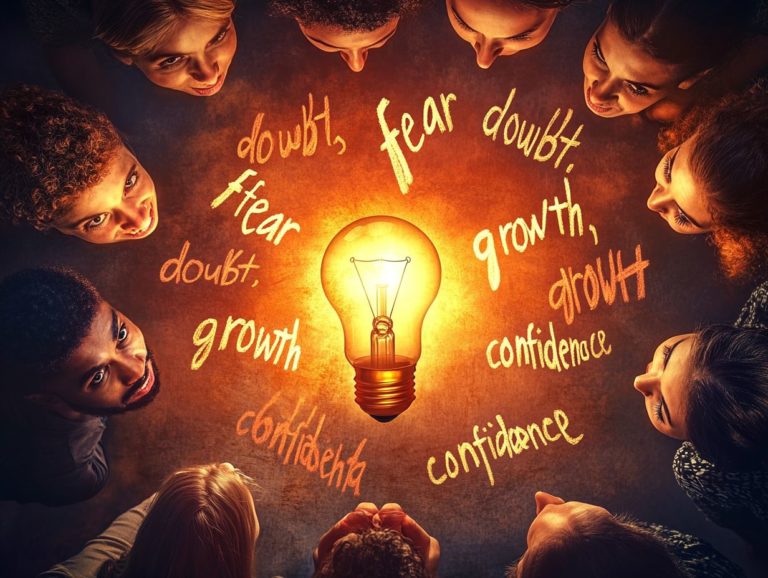10 Personal Development Challenges for You
In today s fast-paced world, personal development has never been more essential.
Whether you re aiming to set and achieve meaningful goals, cultivate a positive mindset, or enhance your communication skills, let s dive into ten pivotal challenges designed to foster your growth.
From conquering procrastination to mastering stress management and welcoming change, each section equips you with actionable insights and practical tips.
Start your journey now to unlock your potential and transform your life through the power of personal development.
Contents
- Key Takeaways:
- 1. Setting and Achieving Goals
- 2. Developing a Positive Mindset
- 3. Overcoming Procrastination
- 4. Time Management and Prioritization
- 5. Building and Maintaining Relationships
- 6. Dealing with Failure and Rejection
- 7. Improving Communication Skills
- 8. Managing Stress and Anxiety
- 9. Embrace Self-Discipline: Your Key to Success!
- 10. Embrace Change: Your Path to Growth!
- How Can Personal Development Benefit Your Life?
- What Are the Key Areas of Personal Development?
- How Can One Identify Their Personal Development Needs?
- What Are Some Common Obstacles in Personal Development?
- How Can One Stay Motivated in Their Personal Development Journey?
- What Are Some Practical Tips for Personal Development?
- Frequently Asked Questions
- 1. What are the 10 personal development challenges for you?
- 2. Why are these challenges important for personal development?
- 3. How can I effectively set and achieve my goals?
- 4. What are some tips for stepping out of my comfort zone?
- 5. Why is self-care and self-love important for personal development?
- 6. How can I build healthy relationships for personal development?
Key Takeaways:
- Set specific and achievable goals to create a roadmap for personal growth.
- Adopt a positive mindset to overcome challenges and attract success.
- Combat procrastination by breaking tasks into smaller, manageable chunks.
- Prioritize tasks and manage time effectively to increase productivity.
- Nurture relationships for personal and professional fulfillment.
- View failures as opportunities for growth and learning.
- Improve communication skills to build stronger connections and avoid conflicts.
- Manage stress through self-care practices and seeking support when needed.
- Cultivate self-discipline to stay focused on personal development goals.
- Embrace change and adaptability to thrive in ever-evolving environments.
1. Setting and Achieving Goals
Setting and achieving goals is essential for your journey of self-growth and personal development. It guides you through daily challenges, helps your emotional intelligence, and inspires you to tackle productivity hurdles.
By establishing clear and actionable goals, you can navigate your path toward self-improvement and cultivate healthy habits that lead to transformative changes in your life. Using strategies like SMART Specific, Measurable, Achievable, Relevant, and Time-bound can significantly boost the effectiveness of this process.
Techniques to enhance motivation, such as visualizing your success or breaking larger goals into smaller tasks, are crucial for maintaining momentum. Engaging in daily reflection allows you to assess your progress and adjust your goals as needed, fostering a sense of adaptability vital for growth.
By weaving emotional intelligence into your approach, you ll gain a deeper understanding of your motivations and emotions, allowing you to align your actions with your aspirations more effectively over time.
2. Developing a Positive Mindset
Developing a positive mindset is vital for enhancing your emotional well-being and creating a fulfilling life. It involves cultivating mindfulness, practicing gratitude, and prioritizing self-care to promote cognitive growth.
These techniques help you recognize and appreciate the good in your life and create a ripple effect benefiting your mental health. Embracing mindfulness encourages deeper awareness of your thoughts and feelings, enabling you to respond to challenges with clarity and resilience. You can also express gratitude to shift your focus from what s lacking to what s abundant, enhancing your emotional state and fostering connections with others.
Self-care whether through physical activity, hobbies, or relaxation plays a crucial role in reducing stress and nurturing a balanced mindset. By integrating these strategies into your daily routine, you can unlock your potential for ongoing cognitive and emotional growth.
3. Overcoming Procrastination
Overcoming procrastination demands a blend of self-discipline and effective time management strategies to counteract decision fatigue. This approach helps you harness motivation techniques that inspire proactive behavior in your personal and professional life.
Recognizing that procrastination often arises from a fear of failure or the weight of overwhelming tasks is crucial in tackling its root causes. By breaking larger tasks into smaller pieces, you can foster a sense of accomplishment that reinforces your motivation.
Employing techniques such as working for 25 minutes, then taking a 5-minute break can greatly enhance your productivity. Creating a structured schedule and prioritizing tasks using methods like the Eisenhower Matrix enables you to allocate your time more effectively.
Thus, cultivating self-discipline is less about a monumental overhaul and more about embracing a journey of small, consistent changes.
4. Time Management and Prioritization
Effective time management and prioritization are key skills for navigating daily challenges and overcoming productivity hurdles. They help you focus on tasks that align with your goals and values while using motivational techniques to maintain your momentum.
By using strategies like the Eisenhower Matrix, you can sort your tasks into urgent and important segments. This allows you to make informed decisions about where to direct your efforts. This method clarifies what needs your immediate attention and highlights tasks that can be delegated or eliminated.
For example, you might find that responding to non-urgent emails consumes valuable time, hindering your progress on strategic projects. Techniques like the Pomodoro Technique, which breaks work into focused intervals with short breaks, will boost your concentration and keep your motivation high throughout the day.
5. Building and Maintaining Relationships
Building and maintaining relationships not only enhances your understanding of feelings but also fosters a strong sense of community. However, it can present challenges that require self-care and effective communication to navigate successfully.
Understanding the nuances of emotional intelligence elevates your interactions, leading to deeper connections and greater empathy. Common challenges, like misunderstandings and differing expectations, can test even the strongest bonds.
To overcome these hurdles, practice active listening. This means truly absorbing what the other person shares and validating their feelings.
Self-care is crucial; it nurtures your well-being and builds the resilience needed to approach conflicts with patience and clarity. By encouraging open dialogue, you can help your relationships thrive and turn challenges into valuable opportunities for growth.
6. Dealing with Failure and Rejection

Dealing with failure and rejection is an inevitable part of your personal growth journey. It highlights the importance of emotional health, resilience, and applying personal development strategies to overcome confidence challenges mindfully.
To navigate these tough experiences, embracing mindfulness practices will ground you in the moment. Techniques like meditation or focused breathing help you process emotions without being overwhelmed by stress.
Building confidence after setbacks means reframing negative thoughts and celebrating small victories. A growth mindset encourages you to view challenges as learning opportunities rather than permanent defeats.
By focusing on the lessons each experience provides, you can cultivate resilience, turning failure into a powerful catalyst for your personal evolution.
7. Improving Communication Skills
Improving your communication skills is key to your personal growth, nurturing your understanding of feelings, and enhancing your interpersonal relationships. This is especially important when facing challenges that require clear and effective dialogue.
By using various techniques, you can deepen your understanding of yourself and those around you. For instance, active listening promotes genuine engagement with your conversation partners, making them feel heard and valued.
On the other hand, assertiveness allows you to express your thoughts and feelings confidently without undermining others. These skills are essential for refining your emotional intelligence, leading to smoother interactions and more effective conflict resolution.
Prioritizing these techniques will significantly elevate your ability to connect with others, enriching all forms of communication in your life.
8. Managing Stress and Anxiety
Managing stress and anxiety is crucial for your emotional health. It requires effective stress reduction techniques, mindfulness practices, and self-care challenges that enhance resilience and well-being.
Recognizing your personal stressors is the first step in developing strong coping mechanisms. By incorporating mindfulness techniques, such as meditation and deep-breathing exercises, you can significantly improve your emotional clarity and focus.
Creating a self-care routine whether through regular physical activity, diving into hobbies, or nurturing social connections plays a vital role in relieving tension. Actively engaging in these practices fosters a sense of enablement, leading you toward a more balanced and fulfilling life.
9. Embrace Self-Discipline: Your Key to Success!
Self-discipline is an essential skill in your journey of personal development. It empowers you to establish healthy habits and seamlessly incorporate daily awareness of your thoughts and feelings into your routine, all while using motivation techniques to stay focused on your goals.
Developing this vital skill requires commitment to intentional practice and awareness of things that affect your behavior. By implementing effective habit-forming strategies, such as setting clear and achievable goals and sticking to a consistent schedule, you can greatly enhance your ability to stay disciplined.
Establishing accountability measures whether through partnerships or self-tracking tools will provide encouragement and reinforce your commitment. Integrating daily practices of awareness can be transformative, helping you stay present and in tune with your motivations. This leads to sustained progress in your personal and professional efforts.
10. Embrace Change: Your Path to Growth!
Embracing change and adaptability is essential for your personal growth. It enables you to navigate transformative challenges with resilience while enhancing your emotional intelligence and fostering cognitive development.
This journey not only equips you to handle unexpected situations more effectively but also lets you think critically and creatively in problem-solving scenarios.
Life situations, whether career transitions or personal relationships, can present formidable obstacles unless you learn to embrace flexibility.
Implementing strategies such as:
- Setting small, manageable goals,
- Seeking feedback from peers, and
- Maintaining a positive mindset
can significantly reduce the fears that often accompany change. Facing these challenges can lead to a richer understanding of yourself, fostering deeper relationships and a more nuanced emotional intelligence that benefits both you and those around you.
How Can Personal Development Benefit Your Life?
Personal development presents a wealth of benefits that can elevate various aspects of your life, from personal growth to emotional well-being. It enables you to overcome productivity challenges while fostering healthy habits that lead to a more fulfilling existence.
When you actively engage in self-improvement practices, you often experience a remarkable boost in your emotional health. For instance, journaling clarifies your thoughts and emotions, granting you greater self-awareness and a deeper understanding of your feelings.
Incorporating mindfulness techniques into your daily routine enhances your focus and diminishes stress, allowing for a more balanced approach to life’s demands. Engaging in self-care activities, like exercise or meditation, significantly contributes to your overall well-being by promoting both physical vitality and mental clarity.
Collectively, these practices enable you to navigate challenges with resilience, transforming obstacles into opportunities for growth.
This is your chance! Start your personal development journey today and see the amazing changes in your life!
What Are the Key Areas of Personal Development?

The key areas of personal development include emotional intelligence, cognitive growth, and healthy habits. Together, these aspects enhance your overall well-being.
These elements elevate personal satisfaction and foster meaningful social interactions. Emotional health is fundamental; it shapes your ability to navigate life’s ups and downs while nurturing resilience.
Honing your thinking skills sharpens your ability to make decisions, which is crucial for achieving personal goals. Physical well-being also plays a vital role, supporting your energy levels and reinforcing your motivation for self-improvement.
When you integrate these areas, you create combined benefits where advancements in one domain ignite growth in others. This leads to a well-rounded approach to personal development.
How Can One Identify Their Personal Development Needs?
Identifying your personal development needs requires self-awareness and daily reflection. This practice helps you understand your emotional health better and pinpoint areas where self-care may be lacking.
Start journaling today to boost your self-awareness! Taking just a few moments each day to jot down your thoughts can unlock a deeper understanding of your emotional triggers.
Incorporating mindfulness techniques into your routine can enhance your presence and reveal areas ripe for growth. Conducting a self-assessment can further illuminate your personal development opportunities.
This might involve setting specific goals, seeking feedback from trusted friends, or using structured reflective questions to evaluate your strengths and weaknesses. These actions can guide you toward meaningful transformation.
What Are Some Common Obstacles in Personal Development?
Common obstacles in personal development often include decision fatigue and confidence challenges. To overcome these hurdles, consider exploring personal development podcasts to follow, which can help you feel less overwhelmed and more connected to your true potential.
When faced with countless choices, mental strain can lead to paralysis by analysis, making it hard to take action. Self-doubt can block your path to pursuing goals, while a lack of emotional intelligence might strain relationships.
By embracing mindful decision-making and setting achievable milestones, you can gradually overcome these challenges. Cultivating emotional intelligence through reflection and empathy is essential for navigating these obstacles.
This fosters deeper connections and enables a more resilient approach to your personal growth.
How Can One Stay Motivated in Their Personal Development Journey?
Staying motivated in your personal development journey is crucial for continuous growth. It requires effective motivation techniques, self-discipline, and daily mindfulness.
Start with small, achievable goals that pave the way for a sense of accomplishment. Celebrating each milestone reinforces your commitment and inspires you to take on the next challenge.
Cultivating self-discipline is key to maintaining focus on your objectives, even amid distractions. By integrating daily mindfulness practices, you can center your thoughts for clearer decision-making.
This strategic combination not only sustains your motivation but also builds resilience against setbacks. Take the first step in your personal development journey today!
What Are Some Practical Tips for Personal Development?
Practical tips for personal development include strategies to cultivate healthy habits, mindfulness, and emotional well-being. These are vital for your growth.
When you integrate consistency and commitment into these practices, you can start to see meaningful progress unfold over time.
For example, dedicating just 10 minutes each morning to meditation can greatly enhance your focus and alleviate stress. This leads to a more balanced mindset.
Maintaining a daily gratitude journal can shift your perspective, fostering a more positive outlook on life.
Embracing small yet impactful habits like reading for 15 minutes before bed or taking a brisk walk during your lunch break can significantly stimulate your personal growth.
These incremental changes become powerful tools when practiced consistently, paving the way for a fulfilling future.
Frequently Asked Questions
1. What are the 10 personal development challenges for you?

- Setting clear and achievable goals
- Stepping out of your comfort zone
- Improving time management skills
- Cultivating a positive mindset
- Practicing self-care and self-love
- Building healthy relationships
- Learning a new skill or hobby
- Overcoming fear and self-doubt
- Embracing change and adaptability
- Taking accountability for your actions
2. Why are these challenges important for personal development?
These challenges help you grow into your best self. They push you beyond limits and build new skills, ultimately leading to personal growth and fulfillment.
3. How can I effectively set and achieve my goals?
To effectively set and achieve your goals, start by writing them down and making them specific, measurable, attainable, relevant, and time-bound. Break them down into smaller, actionable steps and create a plan.
Stay motivated and hold yourself accountable by regularly reviewing your progress and adjusting accordingly.
4. What are some tips for stepping out of my comfort zone?
Start by identifying your fears and limiting beliefs. Then, set small goals and take small steps towards facing those fears.
Surround yourself with supportive people, and celebrate every small win. Remember, growth happens outside your comfort zone.
5. Why is self-care and self-love important for personal development?
Self-care means taking time to care for your physical and mental health. Self-love is about treating yourself with kindness and respect.
Both are crucial for prioritizing your well-being and happiness, forming a strong foundation for personal growth.
6. How can I build healthy relationships for personal development?
Start by setting boundaries and communicating effectively. Practice active listening, empathy, and understanding.
Surround yourself with people who support your development, and let go of toxic relationships. Healthy relationships involve mutual respect, trust, and support.






